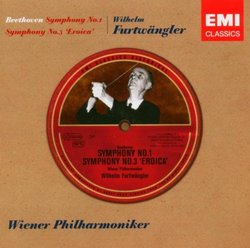| All Artists: Ludwig van Beethoven, Wilhelm Furtwängler, Vienna Philharmonic Orchestra Title: Beethoven: Symphony No. 1; Symphony No. 3 'Eroica' Members Wishing: 0 Total Copies: 0 Label: EMI Classics Release Date: 4/20/2004 Genre: Classical Styles: Forms & Genres, Symphonies, Historical Periods, Classical (c.1770-1830), Modern, 20th, & 21st Century, Symphonies Number of Discs: 1 SwapaCD Credits: 1 UPC: 724358582123 |
Search - Ludwig van Beethoven, Wilhelm Furtwängler, Vienna Philharmonic Orchestra :: Beethoven: Symphony No. 1; Symphony No. 3 'Eroica'
 | Ludwig van Beethoven, Wilhelm Furtwängler, Vienna Philharmonic Orchestra Beethoven: Symphony No. 1; Symphony No. 3 'Eroica' Genre: Classical
|
Larger Image |
CD Details |
CD ReviewsTruly "Heroic" performance Sungu Okan | Istanbul, Istanbul Turkey | 01/27/2006 (5 out of 5 stars) "In my opinion, Wilhelm Furtwangler's Beethoven readings are definitive. Actually, there are "authentic" readings with period instruments made by Harnoncourt, Norrington, Hogwood. But these Furtwangler readings (may be both in modern and authentic reading) are reference, I think. Wiener Philharmoniker, played with sensitive, powerful too. Furtwangler, of course, one of the greatest conductors of century, and these Beethoven recs. are his best. The Symphony No. 1 performed joyful, lovely. Still, this symphony has a Haydn atmosphere and yet, it has the energy of youth. But the "Eroica" Symphony, has a typic Beethoven character. As you know, Beethoven had a soul of hero! And he actually loved Napoleon Bonaparte, becaues of he was a hero of French Revolution. And actually Beethoven called that symphony as "dedicaded to Napoleon". But then, Napoleon was to be Emperor and he started to attack to Austria, all of Wiener. So, Beethoven, in all during his life, hated Napoleon, and erased his name, then replaced it as "Symphony for a dead great hero" in other words "Eroica". And Wiener Philharmoniker under the baton of Furtwangler, feels that soul of hero. They are played Beethovenian "sforzandos" (very accented fortissimo notes) very striking. The Marcia funebre is played drammatic, impressive. The sound quality is very good mono, recorded in 1950's. Even, these are historic recs. And worth to listening. At this price, you can not wrong with it. Highly recommended. " Furtwangler's most polished, least heroic "Eroica" Santa Fe Listener | Santa Fe, NM USA | 01/07/2006 (4 out of 5 stars) "Furtwangler's discography has expnaded enormously--to over 250 CDs--thanks to live concerts and air checks. If we only had the present studio recordings from 1952, we would think that his approach to the Eroica was smoth, beautifully balanced, full-voiced, and not very dramatic. The frst movement is almost an amble, not just in its deliberate tempo but in mood as well---it's the most relaxed Eroica I've ever heard. The great funeral march is far from tragic; it sounds like a serene elegy. How strange that this emotional, frequently volaatile Beethoven conductor should take such a phlegmatic view. The Vienna Phil. plays with golden tone, despite the lack of attack in all movements, including the opening of the finale, which is low-key to a fault. The Sym. 1 from the same sessions is just as genial and even more romantic than Bruno Walter's late recording in Los Angeles with the Columbia Sym., except that the Vienna Phil. plays much better. The moderato finale eschews any hint of Haydnesque wit. The mono sound on this remastering is quite natural, a bit murky, and blessedly free of wiry strings. I'm not sure what to make of these two readings. They are masterful in their way, of course, but so far removed from what we think of as Beethoven's revolutionary impulse that listeners should be prepared." Very good peformance at a great price Alexandre Dufresne | Minnesota | 11/28/2009 (5 out of 5 stars) "This CD contains the Beethoven 1st and 3rd synphonies performed by Wilhelm Furtwangler and the Wiener Philharmoniker in the early 1950's.
Furtwanglers 1944 version of the Eroica is his best version in my opinion, but given that none of the major music giants have released a cd with his 1944 recording on it, this is the best version available. It was briefly available on the Tahra label, but only a limited number were produced and now long out of print. All of Furtwanglers 1940's recordings from during the war are classics, though mostly mono recordings using budget 1940's sound equipment. Other great conductors of the 3rd symphony were Szell, Bohm, Karajan and maybe Vanska, but Furtwangler has them all beat. In regards to the first symphony, the copy on this CD is in my opinion the best version conducted by Furtwangler, even when you factor in his famous WW2 era recordings from the 1940's. Having listened to several conductors perform the 1st, Furtwangler always stands out as the standard for a quality performance by bringing a sense of exitement or action/ avendture to the music. Karajan takes a heavy handed Germanic approach, Szell a precision/ pefectionist approach, Walter a poetic approach and Vanska a slightly Walter like approach with Szells precision and desire for perfection. Lastly, I should point out that Furtwanglers WW2 and pre WW2 recordings and perfmances used period instruments, so that affects the sound quality in addition to the recording technology of the day. After the war, period instruments were deemed to expensive and the switch was made to more modern instruments. If you like Furtwangler's recordings or want to give it a try, then buy this CD and the companion CD containing the 5th and 7th symphonies." |

 Track Listings (8) - Disc #1
Track Listings (8) - Disc #1